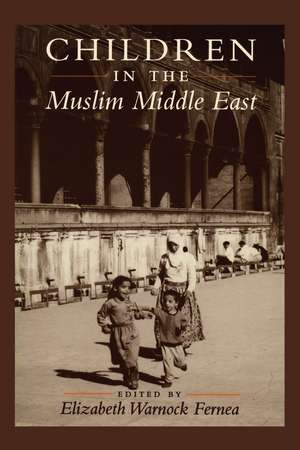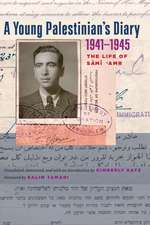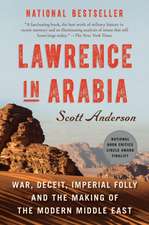Children in the Muslim Middle East
Editat de Elizabeth Warnock Ferneaen Limba Engleză Paperback – noi 1995
The forty-one pieces are organized into sections on the history of childhood, growing up, health, work, education, politics and war, and play and the arts. They are presented in many forms: essays in history and social science, poems, proverbs, lullabies, games, and short stories. Countries represented are Egypt, Jordan, Morocco, Tunisia, Israel/West Bank, Kuwait, Saudi Arabia, Iran, Iraq, Syria, Sudan, Lebanon, Turkey, Yemen, and Afghanistan.
This book complements Elizabeth Fernea's earlier works, Women and the Family in the Middle East and Middle Eastern Muslim Women Speak (coedited with Basima Bezirgan). Like them, it will be important reading for everyone interested in the Middle East and in women's and children's issues.
Preț: 368.28 lei
Nou
Puncte Express: 552
Preț estimativ în valută:
70.47€ • 73.76$ • 58.65£
70.47€ • 73.76$ • 58.65£
Carte tipărită la comandă
Livrare economică 31 martie-14 aprilie
Preluare comenzi: 021 569.72.76
Specificații
ISBN-13: 9780292724907
ISBN-10: 029272490X
Pagini: 495
Ilustrații: 21 b&w, 5 Line D, 1 Map, 36 Tbls
Dimensiuni: 152 x 229 x 30 mm
Greutate: 0.74 kg
Ediția:New.
Editura: University of Texas Press
Colecția University of Texas Press
ISBN-10: 029272490X
Pagini: 495
Ilustrații: 21 b&w, 5 Line D, 1 Map, 36 Tbls
Dimensiuni: 152 x 229 x 30 mm
Greutate: 0.74 kg
Ediția:New.
Editura: University of Texas Press
Colecția University of Texas Press
Notă biografică
The late Elizabeth Warnock Fernea was Professor of English and Middle Eastern Studies at the University of Texas at Austin.
Cuprins
- Preface
- Acknowledgments
- Part I. Introduction
- Childhood in the Muslim Middle East (Elizabeth Warnock Fernea)
- Children in the Arab Gulf States: Some Important and Urgent Issues (Hassan al-Ebraheem)
- The Code of Children’s Rights in Islam (Muhammad Abdelkebir Alaoui M’Daghri, translated by Moncef Lahlou )
- Part II. Growing Up
- Adoption in Islamic Society: a Historical Survey (Amira al-Azhary Sonbol)
- Children of Amman: Childhood and Child Care in Squatter Areas of Amman, Jordan (Seteney Shami and Lucine Taminian)
- Kuwaiti Lullabies (Translated and introduced by Farha Ghannam)
- Changing Child-Rearing Patterns in An Egyptian Village (Judy H. Brink)
- Love Conquers All? Changing Images of Gender and Relationship in Morocco (Susan Schaefer Davis and Douglas A. Davis)
- Sudanese Lullabies and Adolescent Songs (Collected and translated by Teirab AshShareef)
- To My Son Mehmet, I Present Our Fruits (Bedri Rahmi Eyuboglu, translated by N. Menemencioglu and Sascha B. Cohen)
- My Religion Series (M. Yasar Kandemir, translated by Akilé Gürsoy)
- Teach Your Children the Love of God’s Messenger (Muhammad Abdo Yamani, translated and summarized by Farha Ghannam)
- Orphanages in Egypt: Contradiction or Affirmation in a Family-Oriented Society (Andrea B. Rugh)
- Part III. Children’s Health
- Child Care and Child Health in Low-Income Neighborhoods of Cairo (Homa Hoodfar)
- Bodily Mutilation of Young Females (Cairo Family Planning Association)
- Life and Health of Jordanian Children (Staffan Janson)
- Child Mortality and the Changing Discourse On Childhood in Turkey (Akilé Gürsoy)
- Women’s Laments for Children Who Have Died (Collected by Jamal Zaki ad-Din al-Hajjaji, translated by Susan Slyomovics and Suzanne Quails)
- Part IV. Children and Work
- The Child As Economic Investment: Preliminary Reflections (Aicha Belarbi, translated by Moncef and Wafaa Lahlou)
- Children’s Contribution to Social Security and the Family in Egypt (Helmi R. Tadros)
- Working Children in Cairo: Case Studies (Eftetan O. Farrag)
- The Rungs of the Ladder (Daisy al-Amir, translated by Caroline Attieh)
- An Unmarried Girl and a Grinding Stone: A Turkish Girl’s Childhood in the City (Jenny B. White )
- Part V. Children’s Education
- Early Education in Kuwait: a Brief Description of the Nursery Curriculum (A’isha al-Haj Hasan and Lu’lu’a al-Qattami, translated by Ahmed Sweity)
- Revolution for Children in Saudi Arabia (Jerine B. Bird)
- Turkish First-Grade Text (From Jinn Ali Starts School, Cin Ali Publications)
- Alternative Education Under the Intifada: The Palestinian Response to Israeli Policy in the Occupied Territories (Abdalla al-Kurd and Barton R. Herrscher)
- Childhood and Education in Highland North Yemen (Susan Dorsky and Thomas B. Stevenson)
- Gender Roles in Iranian Public School Textbooks (Adele K. Ferdows)
- Changing Perceptions of Iranian Identity in Elementary Textbooks (Patricia J. Higgins and Pirouz Shoar-Ghaffari )
- Part VI. Children, Politics, and War
- The Rights of the Child under Islamic Law: Prohibition of the Child Soldier (Maryam Elahi)
- Children of Fire (Ribat Al-Fatah) (Hoda al-Namani, translated by Najib Mokhtari and Christopher Middleton)
- Girls’ Participation in Combat: a Case Study From Lebanon (Kari H. Karamé)
- Attitudes of Teenage Girls to the Iranian Revolution (Farhad Khosrokhavar)
- Poetry and Pageants: Growing Up in the Syrian Vanguard (Evelyn Early )
- Part VII. Children and Play, Children and the Arts
- Children’s Games and Songs in Egypt (Mohammed Omran, translated by Ahmed Sweity)
- Patterns of Musical Development Among Children in Afghanistan (Veronica Doubleday and John Baily)
- The Small Lamp (Ghassan Kanafani, translated by Tura Campanella Cook)
- Children’s Games and Songs Ffrom Tunisia (Collected and translated by Sabra Webber)
- Themes Reflected in Palestinian Children’s Literature (Taghreed Alqudsi-Ghabra)
- Iftah Ya Simsim (Open Sesame) and Children in Baghdad (Misbah al-Khayr and Hashim al-Samira’i, translated by Ahmed Sweity)
- Conclusion
- Contributors
Descriere
This anthology is an attempt to look at the current situation of children in the Middle East by presenting materials by both Middle Eastern and Western scholars.












